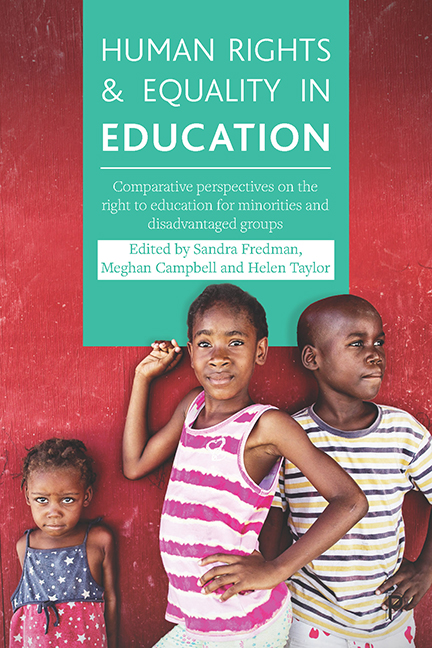 Human Rights and Equality in Education
Human Rights and Equality in Education Book contents
- Frontmatter
- Contents
- Notes on contributors
- Foreword
- Human rights and equality in education: Introduction
- Part I The role of public and private actors in education
- Part II Balancing the right to freedom of religion and culture and the right to education
- Part III Gender equality in education: moving beyond access to primary education
- Part IV Litigating for quality and equality in education
- Index
two - The dynamics of regulating low-fee private schools in Kenya
Published online by Cambridge University Press: 19 April 2022
- Frontmatter
- Contents
- Notes on contributors
- Foreword
- Human rights and equality in education: Introduction
- Part I The role of public and private actors in education
- Part II Balancing the right to freedom of religion and culture and the right to education
- Part III Gender equality in education: moving beyond access to primary education
- Part IV Litigating for quality and equality in education
- Index
Summary
Introduction
The role of the government in the discourse on education has been transformed in many African countries with the increased participation of the private sector in education, whether through government initiatives or the efforts of the private sector. This change, signalled by the gravitation towards neoliberal marketisation, marks the conversion of education from a contested space of knowledge to a more commodity-oriented space, where rules of the market influence change, growth and development. Education then teeters on the divide between a public and a private good.
The Kenyan Constitution specifically protects a right to education. Articles 43(1)(f) and 53 of the Constitution of Kenya 2010 guarantee the right to education and children's right to basic education respectively. Despite numerous laws, regulations and policies implementing the right to education, there remains the reality of government failure to provide access to quality learning. There is still a disconnection between the regulatory aspirations that facilitate the right to education and the actual implementation of programmes that realise this right. This has led to the mushrooming of numerous small, independent low-fee private schools and the consequent introduction of larger, more corporate low-fee private school chains. The presence of these schools has elicited various government responses through policy and regulation.
Before considering these government responses, it is necessary to address the matter of varying terminology used across academia and education practice to refer to these kinds of private schools. The global discourse on private schools for the poor has yielded the terms ‘low-cost’ private schools and ‘low-fee’ private schools. I reject the use of the term ‘low-cost’ because, while the argument has been made that these schools charge relatively low user fees, the cost of attending them – both in financial and non-financial terms – is unclear, particularly when viewed through an equality, equity and social justice lens. In Kenya, the contextual term for ‘low-fee’ private schools is ‘APBET’ schools (Alternative Provision of Basic Education and Training), after the 2009 APBET Policy. Other terms that have been used in Kenya are ‘complementary’ schools and ‘non-formal’ schools. In this chapter, I will use ‘low-fee’ private schools and ‘APBET’ schools interchangeably, with the latter term used when highlighting issues relevant to the Kenyan context.
- Type
- Chapter
- Information
- Human Rights and Equality in EducationComparative Perspectives on the Right to Education for Minorities and Disadvantaged Groups, pp. 25 - 44Publisher: Bristol University PressPrint publication year: 2018


